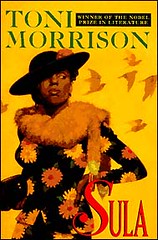I didn't have the chance to take a picture of the posters yesterday. And now they are all ripped to pieces.
Posters in Surra, scattered around, not too many. They say something like "We can't be bought by the Dinar," and "We're not for sale" (rough translation).
Now who would rip such posters?
Saturday, June 17, 2006
Toni Morrison: Sula. 1973
"Once upon a time there was an old woman. Blind but wise." Or was it an old man? A guru, perhaps. Or a griot soothing restless children. I have heard this story, or one exactly like it, in the lore of several cultures. Toni Morrison. Nobel Lecture.
Two girls, raised in two different matriarchal families, finally realize that the bond that unites them as friends is stronger than other societal bonds that kept them apart.
Eva’s husband walks out on her leaving her with two girls and a boy. Her house becomes a place where many seek shelter. But the house lacks proper order, an attribute Morrison reserves for those who are not willing to allow a space for differences among people. As part of her illogical, disorderly fashion, Eva takes in 3 boys and calls them all Dewey, against everyone’s quizzical inquiry as to how to distinguish between the 3. Her daughter Hannah also loses her own husband when their daughter Sula is only 3, leaving Sula to be raised in an a-typical matriarchal family.
Helene Wright is raised by her grandmother away from the Creole whore who gave birth to her. When Helene marries a seaman who is constantly away and bears her daughter Nel, she raises her in such an orderly fashion that makes this matriarchal family the opposite of that of Sula.
It is this opposition that joins the two girls and leads to a friendship that becomes the main focus of the novel, even when Morrison crowds her novels with many more interesting characters and stories:
Eva herself kills her own son when his war trauma leaves him too attached to his mother, but then throws herself out the second floor window onto her burning daughter in an attempt to save her life.
Sula sees her own mother burning but doesn’t move to save her, partly because of hearing her mother in an earlier occasion admit that she loves, but does not like Sula, her daughter.
There is also Shadrack, the shellshock veteran who celebrates National Suicide Day every year, and who finally leads some townfolks into a tunnel, and accidentally, to their death.
Another one of Toni Morrison’s successes. If you haven’t touched a Morrison yet, what are you waiting for?
The old woman is keenly aware that no intellectual mercenary, nor insatiable dictator, no paid-for politician or demagogue; no counterfeit journalist would be persuaded by her thoughts. Toni Morrison. Nobel Lecture.
Two girls, raised in two different matriarchal families, finally realize that the bond that unites them as friends is stronger than other societal bonds that kept them apart.
Eva’s husband walks out on her leaving her with two girls and a boy. Her house becomes a place where many seek shelter. But the house lacks proper order, an attribute Morrison reserves for those who are not willing to allow a space for differences among people. As part of her illogical, disorderly fashion, Eva takes in 3 boys and calls them all Dewey, against everyone’s quizzical inquiry as to how to distinguish between the 3. Her daughter Hannah also loses her own husband when their daughter Sula is only 3, leaving Sula to be raised in an a-typical matriarchal family.
Helene Wright is raised by her grandmother away from the Creole whore who gave birth to her. When Helene marries a seaman who is constantly away and bears her daughter Nel, she raises her in such an orderly fashion that makes this matriarchal family the opposite of that of Sula.
It is this opposition that joins the two girls and leads to a friendship that becomes the main focus of the novel, even when Morrison crowds her novels with many more interesting characters and stories:
Eva herself kills her own son when his war trauma leaves him too attached to his mother, but then throws herself out the second floor window onto her burning daughter in an attempt to save her life.
Sula sees her own mother burning but doesn’t move to save her, partly because of hearing her mother in an earlier occasion admit that she loves, but does not like Sula, her daughter.
There is also Shadrack, the shellshock veteran who celebrates National Suicide Day every year, and who finally leads some townfolks into a tunnel, and accidentally, to their death.
Another one of Toni Morrison’s successes. If you haven’t touched a Morrison yet, what are you waiting for?
The old woman is keenly aware that no intellectual mercenary, nor insatiable dictator, no paid-for politician or demagogue; no counterfeit journalist would be persuaded by her thoughts. Toni Morrison. Nobel Lecture.
Subscribe to:
Comments (Atom)

